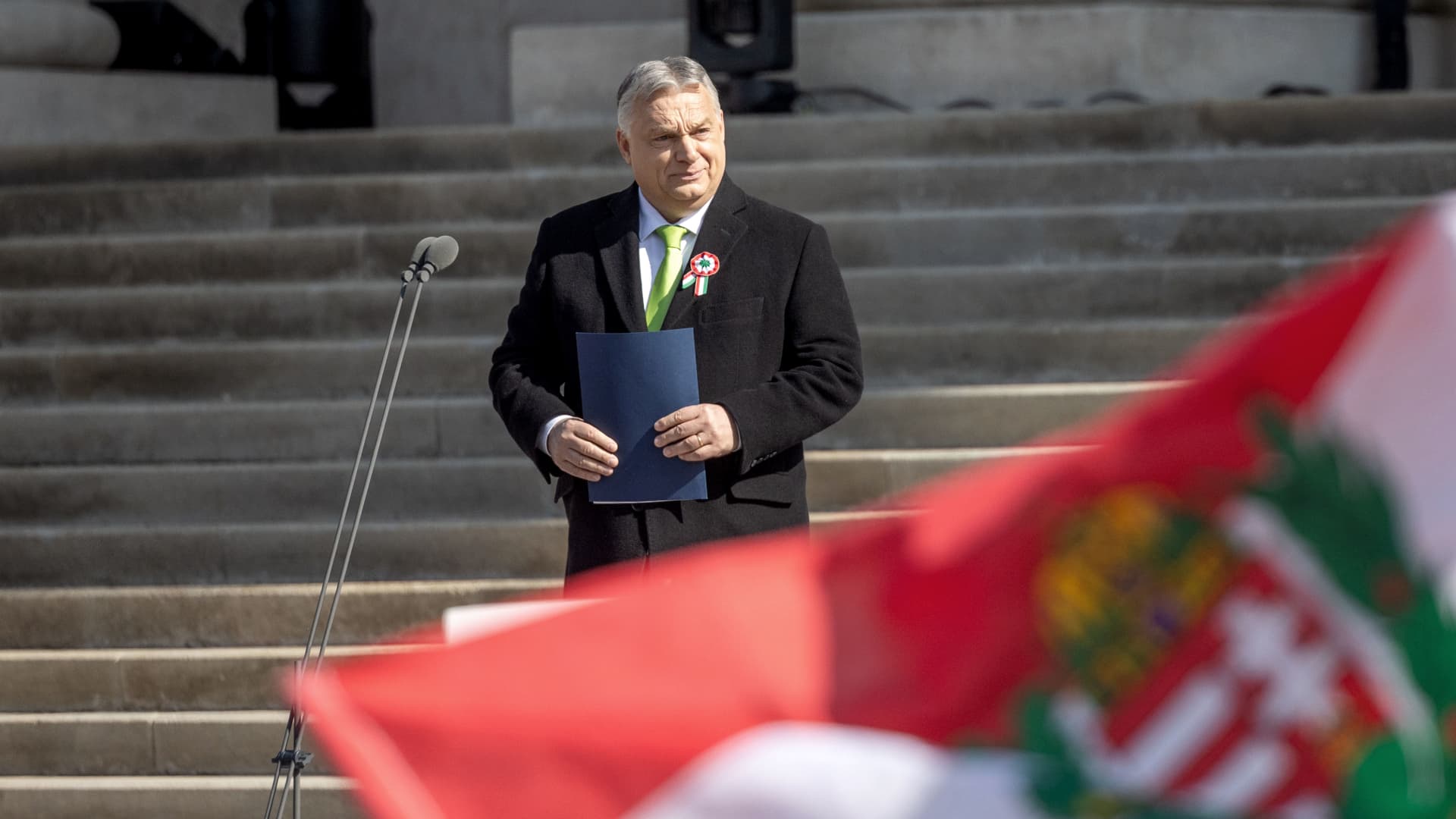Hungary’s Prime Minister Viktor Orban arrives to attend a European Council summit at the EU headquarters in Brussels on March 21, 2024.
Sameer Al-doumy | Afp | Getty Images
Hungarian Prime Minister Viktor Orban has run into political trouble ahead of European parliamentary elections in June, with his ruling party shaken by two political scandals within six weeks.
Orban is a long-time ally of former U.S. President Donald Trump and widely seen as Russian President Vladimir Putin’s closest supporter in the European Union. The right-wing leader has led the central European country since 2010, making him the EU’s longest-serving head of state.
Yet two major scandals have recently rocked his dominance of Budapest’s political landscape at a sensitive time when Hungary is poised to hold both local and European elections in early June.
The latest controversy is “likely to prove more problematic” for Orban, according to analysts at political risk consultancy Eurasia Group, who note that the Hungarian prime minister was previously able to move on from a pardon scandal without a significant loss of public support.
Peter Magyar, a little-known lawyer formerly close to Orban’s government, published an audio recording last week that he says proves top officials conspired to cover up corruption. He has since announced plans to form a new political party to challenge Orban’s Fidesz party.
Lawyer and former government insider Peter Magyar speaks to the people at a demonstration he organised in front of the prosecutor general’s office on March 26, 2024 in Budapest, Hungary.
Janos Kummer | Getty Images News | Getty Images
“From being a practically unknown figure just a few months back, [Magyar] is now successfully organizing big-scale demonstrations in Budapest and is dominating the political agenda and the public discourse,” said Zsuzsanna Vegh, a visiting fellow at the German Marshall Fund of the United States, a transatlantic think tank.
Vegh told CNBC that Magyar’s abrupt political breakthrough indicates a large demand for new political leadership in the country.
“He announced the launch of a political movement, and he may try to tap into a mix of disillusioned Fidesz as well as opposition, and importantly, undecided, maybe even apolitical voters,” Vegh said.
‘Unclear if Magyar can maintain his momentum’
Magyar published a recording on Facebook and YouTube of a conversation with Judit Varga — his then wife and Hungary’s justice minister at the time — in which she implies that she knew government officials had doctored evidence in a corruption case during her tenure.
The revelations prompted several thousand citizens to protest near parliament in Budapest on March 26, according to Reuters. The demonstration followed the country’s largest protest in years that took place in early February, when it emerged that former Hungarian President Katalin Novak had issued a pardon to a man imprisoned for covering up a series of child sexual abuses.
Orban allies, including Novak and Varga, were forced to resign in the wake of the pardon scandal.
A government spokesperson was not immediately available when contacted by CNBC on Wednesday.
Government spokesperson Zoltan Kovacs previously declined to answer emailed questions from Reuters about the content of Magyar’s audio recording, describing the scandal as “much ado about nothing.”
Supporters of Lawyer and former government insider Peter Magyar while he speaks to the people at a demonstration he organised near the Hungarian Parliament on March 26, 2024 in Budapest, Hungary.
Janos Kummer | Getty Images News | Getty Images
In a Facebook post on March 26, Varga accused Magyar of domestic violence during their relationship and claimed she had made the comments under duress. Magyar denied these claims in a separate Facebook post.
Vegh said that Magyar’s political success would largely depend on whether he’s able to sustain the momentum behind him through to Hungary’s parliamentary elections in 2026 — a challenge that analysts at Eurasia Group note is encumbered by the ruling party’s “pervasive” grip over the public media landscape.
“Given these realities, it is unclear if Magyar can maintain his momentum until the European Parliament elections in June unless he continues to make substantive revelations about alleged government wrongdoings,” analysts at Eurasia Group said in a research note published on March 28.
“Moreover, adding another party to the mix of opposition formations might play into Orban’s hands in June’s elections, where parties face a 5% minimum threshold to enter the parliament. Any votes for parties that remain below this threshold will ultimately help Fidesz, potentially allowing the party to increase its share of seats,” they added.

